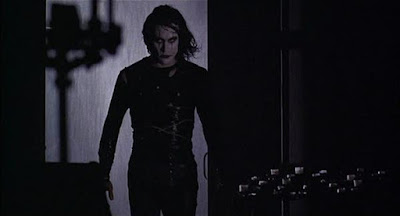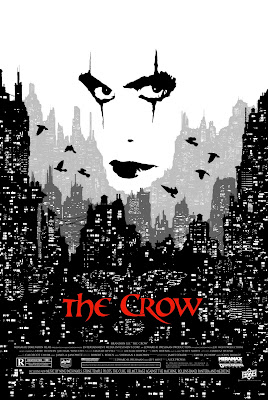Showing posts with label Alex Proyas. Show all posts
Showing posts with label Alex Proyas. Show all posts
Tuesday, October 29, 2019
Trick or Trailers: The Crow (1994)
Every so often movie studios are tasked with the difficult job of marketing a film after its star has passed. One of the most famous examples of which being the release of the dark comic book adaptation The Crow after Brandon Lee's tragic on-set death in 1993.
How do you promote a movie like this, given the circumstances, and not seem like a ghoul? Well, maybe you don't. All things considered, I think they did a fine job.
I know some people believe that The Crow should never have been released but I don't get that. Had Lee's family felt that way, sure, no argument. But if the family believed that the movie should be released and stand as a lasting tribute to Lee, I don't see the issue.
Certainly it's undeniable to anyone who watches The Crow how completely invested in the role of Eric Draven Lee was and, had he lived, there's no doubt that this is the movie that would have vaulted him to another level of stardom.
For it to just sit in a vault would have been a terrible waste.
Especially when the movie is as good as this.
As a fan of James O'Barr's comic, I was thrilled when I heard it was being made into a movie and I was stunned at how well director Alex Proyas brought it to life. Right from the opening shot going over a cool miniature of a decaying Detroit neighborhood, gliding up to the shattered window of Eric and Shelly's apartment, I knew that this was going to be something special. Few comic book adaptations honor their source material as well as Proyas and co. did with The Crow.
I'm surprised that The Crow doesn't get a lot more mention around Halloween time. After all, it does take place on the night before Halloween. Even though it's not a horror film, per se, it does overlap the genre and has plenty of Goth vibes to spare. It also won the Fangoria Chainsaw Award in 1995 for Best Wide Release Film - beating out Wes Craven's New Nightmare, Interview with the Vampire, Wolf, and Mary Shelley's Frankenstein (Ok, it didn't have much competition. But still, it won!) and Lee for Best Actor - beating out the likes of Tom Cruise and Jack Nicholson (yes, cynics will say it was a sympathy win and, yes, these cynics would be absolutely right but I think Lee's performance is still worthy of sincere admiration).
The Crow spawned a number of sequels, all of 'em lousy, and a TV series, which I've actually heard good things about but have never watched myself. Every now and then, talks of a big screen reboot come up but eventually fade away. Who knows what shape a Crow franchise would have taken had Lee lived? The first movie seems so self-contained and brings Eric's story to a satisfying close, I don't see where the point would be of having Lee come back to the part.
And surely, after The Crow's success (and I do think it would have succeeded every bit as well without the morbid attraction of it being the film Lee died on) he would have been moving on to bigger things, right?
It's nice to think so. Why believe anything less?
Lee died twenty six years ago. He'd be fifty four now, had he lived. In other words, he'd still be relatively young. I mean, we don't think of Tom Cruise or Brad Pitt as old and they're both older than fifty four.
Crazy as it is to think, if Lee were alive today and passed, we'd say that it was far too soon. And yet a whole lifetime has gone by since.
I don't know what to say to that other than I think that's why The Crow endures. Beyond being a stylish, moody action/horror film, it's also a reminder that life is fragile and the tomorrow we dream about is not always the tomorrow that we live to enjoy.
Tuesday, August 17, 2010
Summer Shocks 1994: The Crow
 I still remember being taken back by the first shot of The Crow, as the camera glides over an inner city hellhole. I don't know exactly what I had expected from the look of the movie, but I knew that I didn't expect anything so stunning - not from a modestly-budgeted adaptation of a little-known comic. Thanks to the internet, it's so hard to be surprised by movies these days but in '94, it was pretty easy - even for a hardcore movie junkie - and from the get-go, The Crow definitely surprised me.
I still remember being taken back by the first shot of The Crow, as the camera glides over an inner city hellhole. I don't know exactly what I had expected from the look of the movie, but I knew that I didn't expect anything so stunning - not from a modestly-budgeted adaptation of a little-known comic. Thanks to the internet, it's so hard to be surprised by movies these days but in '94, it was pretty easy - even for a hardcore movie junkie - and from the get-go, The Crow definitely surprised me.Nowadays, it's common - even mandatory - for filmmakers to "get" comic books. Many still don't - as Jonah Hex proves - but on the whole, Hollywood is more comic-literate now than at any time previously. But in the early '90s, studios and directors were still figuring out how to translate comics to the screen. Unlike, say, the directors of Spawn, Steel, or Judge Dredd, Crow helmer Alex Proyas had a natural affinity for the material he was adapting (by all accounts, star Brandon Lee shared the same affinity) and that made The Crow a true eye-opener.
The day the story broke that Lee had died, I kept hoping the news would turn out to be a hoax. It just seemed too sad to be true. Watching Lee's heartfelt, would've-been-star making performance in The Crow all these years later, it still does.
To read my full Summer Shocks review of The Crow, click here.
Sunday, March 22, 2009
Knowing

Director Alex Proyas' latest genre foray doesn't follow the usual math, displaying an appreciable non-conformist streak. Maybe what's most unusual about Knowing is that Proyas affords his outlandish premise such serious consideration. There's no attempt to use irony to acknowledge or deflect the ludicrousness of the material. If anything, there's a real message that Proyas is preaching here. Whether you agree with that message or not is irrelevant - the fact that it evidences a point of view separates Knowing from what, say, Michael Bay might've done with this same story. Knowing feels personal in a way that big budget genre pieces seldom do.
The story that Knowing offers, passed through a succession of screenwriters and finally rewritten by the team of Stiles White and Juliet Snowden, is an equation for the End Times. When a time capsule filled with the drawings of elementary school children in the '50s is unearthed today, one entry falls into the hands of young Caleb Koestler (Chandler Canterbury), son to John Koestler (Nicholas Cage), a MIT professor and Astrophysicist. Unlike all the other capsule entries, which are all drawings, this one is a series of seemingly unrelated numbers. When John believes that he's divined a startling purpose to these numbers, the movie becomes a race against time to stop the disastrous events that they predict.
Along the way, Proyas puts Cage's character in the middle of two spectacular disasters that, even with his foreknowledge, he can't avert. Most notable of the two being an airplane crashing on a crowded highway that's stunningly staged by Proyas and, in its fiery aftermath, belies Knowing's PG-13 rating. For a modern science fiction film, though, Knowing is far from being heavy on action or special effects and when such elements are employed here they don't seem there to spike the audiences' attention - they just seem there because the story demanded it. While Knowing is a visually stunning movie, Proyas doesn't go for cool shots that only serve to distract - he takes an assured, straight-forward approach that is unfashionable today. Even most dramas have more jittery camerawork than this does. Knowing seems cut from a cloth of an earlier age of filmmaking (even down to the wonderful score by Marco Beltrami, which harkens back to Bernard Herrmann).
In the later half of Knowing, as events escalate, the overriding question is as much how to accept the inevitable as to how to avert it. Do we choose our time or is the end already an immutable event? Is everything that happens in the universe part of an intelligent design or is it random occurrence? The threat of doomsday always looms in genre films - from The Day The Earth Stood Still (1951) to Armageddon (1998) - but no matter how dire the situation is, no matter how huge a rock is headed through space to pummel us, most are quick to end on the up note that our cards came up lucky and the Earth is safe again for another day. More brazen films, like Miracle Mile (1988) and The Rapture (1991) give their protagonists no recourse - except in their ideologies and in their dying dreams.
The beliefs in regards to our purpose on this planet and our place in the cosmic order that Knowing expresses are not universally shared - what beliefs are? - but even though they don't jibe with my personal philosophies, I appreciated the earnest presentation that Proyas gives them. Some might find the conclusion of Knowing too corny for words but putting my cynicism aside, I thought it was satisfying and true to itself. I think it's also true that any other resolution wouldn't have gone through in a movie of this size (reported budget: $50 million). But what some might perceive as a compromise feels like a genuine nod to spirituality to me. The epiphanies of the final stretch of Knowing would be come across as unbearable if they weren't played with the proper sincerity - and Proyas is successful in making a film with a certain set of convictions that is able to bear the merits of speculative entertainment rather than propoganda.
I don't know what kind of audience Knowing will find but I think it's a genre film worth attention and a confirmation of Proyas as director who possesses his own uncommon knowledge of how to avoid artistic catastrophes.
Subscribe to:
Posts (Atom)













